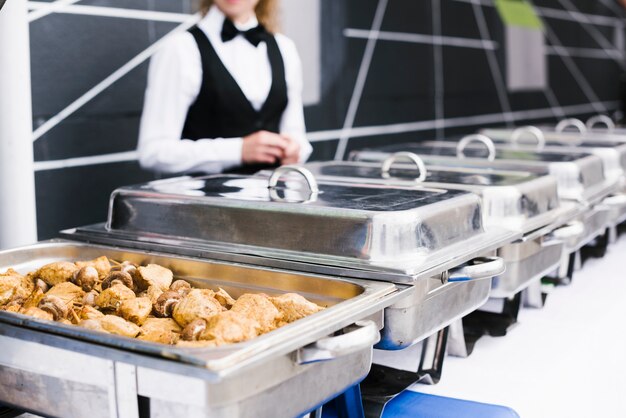Starting a catering business in Botswana presents an exciting opportunity for aspiring entrepreneurs, driven by the country’s growing demand for food services across various events, celebrations, and corporate functions. Whether it’s catering for weddings, corporate meetings, or parties, the catering industry in Botswana offers numerous possibilities for growth. However, like any business venture, building a successful catering business requires careful planning, hard work, and an understanding of the local market. This article will guide you through the essential steps needed to establish and grow a successful catering business in Botswana.
Why Start a Catering Business in Botswana?
Botswana is known for its warm hospitality, rich culture, and vibrant social scene. These characteristics make it an ideal market for a catering business, as people often host events such as weddings, birthday parties, corporate gatherings, and traditional celebrations. The demand for catering services is expanding as more people look for convenient, high-quality food solutions for their special occasions.
The Botswana economy is also growing, with urbanization driving a greater need for professional services. Catering businesses have the opportunity to tap into these changing trends, offering tailored food services to meet diverse customer needs, including specialized menus for dietary preferences and corporate events.
Key Considerations for Building a Catering Business in Botswana
1. Research and Understand the Market
Before starting your catering business, it’s essential to understand the local market. This means:
- Identifying Your Target Audience: Your catering services can be aimed at individuals, families, corporate clients, and event planners. Determine whether you will focus on high-end events, weddings, corporate catering, or informal gatherings.
- Assessing Competition: Research the local catering scene to understand what other businesses are offering, their pricing models, and areas where you can differentiate your services. Identify gaps in the market that you can fill, whether it’s through a unique menu, specialized service offerings, or catering for niche events.
- Understanding Local Food Preferences: Botswana’s culinary tastes are influenced by a mix of traditional dishes, international cuisines, and modern food trends. Understanding these preferences will allow you to design a menu that appeals to local and international clients.
2. Create a Business Plan
A well-thought-out business plan is crucial for the success of your catering business. Your plan should outline your business’s objectives, target market, service offerings, and financial projections. Key sections of your business plan should include:
- Executive Summary: A brief description of your catering business, including its mission, vision, and goals.
- Market Research: Insights into the Botswana catering industry, competitor analysis, and customer demographics.
- Service Offering: Detailed information on the types of catering services you will provide, including menu options, event types, and pricing.
- Marketing Strategy: How you plan to attract customers and build your brand, including advertising, partnerships, and social media marketing.
- Financial Plan: Estimated costs for starting and running the business, including equipment, supplies, staff, and marketing expenses. Include projected revenue and break-even analysis.
3. Register Your Business and Obtain Licenses
To operate legally in Botswana, you need to register your business with the relevant authorities. The process typically involves:
- Registering with the Companies and Intellectual Property Authority (CIPA): This is a mandatory step for formalizing your business. You’ll need to choose a business name, select a legal structure (e.g., sole proprietorship, partnership, or company), and complete the registration process.
- Obtaining Health and Food Safety Certifications: Catering businesses must adhere to strict health and food safety regulations. You will need to register with the Ministry of Health and Wellness and obtain food safety certificates to ensure compliance with hygiene standards.
- Getting the Necessary Permits: Depending on the scale of your catering operation, you may also need specific permits for transporting food, catering at public events, or serving alcohol.
4. Develop Your Menu
A strong, well-crafted menu is a key factor in attracting and retaining customers. Consider the following when developing your menu:
- Variety: Offer a range of options to cater to different tastes and dietary preferences, including vegetarian, vegan, gluten-free, and halal options. Offering both traditional Botswana dishes and international flavors can help appeal to a broader customer base.
- Quality and Freshness: Ensure that the ingredients you use are of the highest quality and always fresh. Consistency in the quality of your food is crucial to building a loyal customer base.
- Portion Size and Presentation: Consider offering different portion sizes to accommodate small and large events. Presentation plays a significant role in the success of your business, especially when catering for special occasions like weddings or corporate events.
- Pricing: Pricing should be competitive but also reflect the quality and expertise you bring to your catering services. Be transparent with clients about costs, and offer packages for different types of events.
5. Set Up a Commercial Kitchen and Equipment
To run a successful catering business, you will need a well-equipped kitchen to prepare large quantities of food. Key considerations include:
- Commercial Kitchen Setup: If you don’t have space at home for a commercial kitchen, you may need to rent or lease one. Ensure that it is fully equipped with commercial-grade ovens, refrigerators, prep tables, and dishwashing facilities.
- Transportation: Depending on the nature of your catering business, you may need vehicles to transport food and supplies to events. Make sure your vehicles are equipped with necessary temperature controls to ensure food safety during transport.
- Food Storage: Invest in proper storage facilities for dry, refrigerated, and frozen goods to keep your ingredients fresh and organized.
6. Build a Strong Online Presence
In today’s digital age, having a strong online presence is essential for attracting customers. Consider the following steps:
- Create a Website: Your website should showcase your catering services, menu options, pricing, and contact details. Consider including an online booking system where customers can inquire about services or place orders for specific events.
- Utilize Social Media: Social media platforms like Facebook, Instagram, and Twitter are powerful tools for marketing your catering business. Regularly post high-quality photos of your food, share customer testimonials, and advertise promotions to build a following.
- Online Reviews and Testimonials: Encourage satisfied customers to leave reviews on platforms like Google or Facebook. Positive reviews help build credibility and attract new clients.
7. Market Your Catering Services
Marketing your catering business effectively will help you reach your target audience and grow your customer base. Consider the following strategies:
- Networking: Attend industry events, wedding expos, and corporate functions to network with potential clients and event planners. Partner with event organizers, venues, and corporate clients to offer your catering services.
- Advertising: Advertise your services through local newspapers, magazines, and radio stations. Digital advertising, such as Facebook ads and Google Ads, can also help reach a wider audience.
- Offer Special Packages: Offer special deals and packages for holidays, festivals, or corporate events to attract more customers. Providing discounts or promotional offers for repeat clients can encourage loyalty.
8. Provide Excellent Customer Service
Customer satisfaction is paramount in the catering industry. To build a successful business, you must ensure that your clients are consistently happy with the service and food quality you provide. Focus on:
- Timely Delivery: Ensure that food is delivered fresh and on time to every event, and that your team is punctual and professional.
- Communication: Maintain open communication with clients to understand their needs and preferences. Customizing services to meet specific client expectations helps build trust.
- Feedback and Improvement: After each event, ask for feedback from clients to continuously improve your services and address any areas of concern.
9. Manage Your Finances
Proper financial management is crucial to the success of any business. Keep track of your expenses, income, and profits to ensure your business remains profitable. Consider:
- Accounting Software: Use accounting software to manage invoices, expenses, and taxes.
- Budgeting: Create a budget for each event and ensure that your pricing covers all costs, including ingredients, labor, and transportation.
Starting a catering business in Botswana can be highly rewarding with the right preparation, strategies, and dedication. By understanding the market, offering high-quality food and excellent customer service, and embracing modern marketing techniques, you can position your catering business for success. Whether you are catering for weddings, corporate events, or private functions, there is a growing demand for professional catering services in Botswana that you can tap into to build a thriving business.





